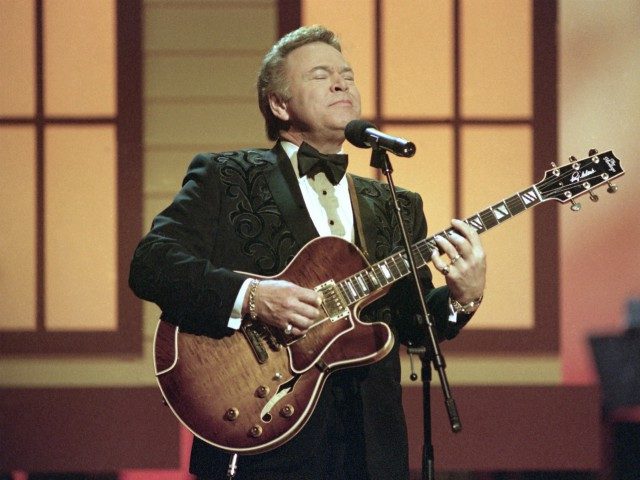Country star Roy Clark, the guitar virtuoso and singer who headlined the cornpone TV show “Hee Haw” for nearly a quarter century and was known for such hits as “Yesterday When I was Young” and “Honeymoon Feeling,” has died. He was 85.
Publicist Jeremy Westby said Clark died Thursday due to complications from pneumonia at home in Tulsa, Oklahoma.
Clark was “Hee Haw” host or co-host for its entire 24-year run, with Buck Owens his best known co-host. Started in 1969, the show featured the top stars in country music, including Loretta Lynn, Tammy Wynette, Charley Pride, Johnny Cash, Merle Haggard, Dolly Parton, as well as other musical greats including Ray Charles, Chet Atkins and Boots Randolph. The country music and comedy show’s last episode aired in 1993, though reruns continued for a few years thereafter.
″‘Hee Haw’ won’t go away. It brings a smile to too many faces,” he said in 2004, when the show was distributed on VHS and DVD for the first time.
“I’ve known him for 60 years and he was a fine musician and entertainer,” Charlie Daniels tweeted on Thursday. “Rest In peace Buddy, you will be remembered.”
Keith Urban, who won entertainer of the year Wednesday night from the Country Music Association, also honored Clark on Thursday. “My first CMA memory is sitting on my living room floor watching Roy Clark tear it up,” Urban tweeted. “Sending all my love and respect to him and his family for all he did.”
Clark played the guitar, banjo, fiddle, mandolin, harmonica and other instruments. His skills brought him gigs as guest performer with many top orchestras, including the Boston Pops. In 1976 he headlined a tour of the Soviet Union, breaking boundaries that were usually closed to Americans.
And of course, he also was a member of the Grand Ole Opry.
His hits included “The Tips of My Fingers” (1963), “Yesterday When I Was Young” (1969), “Come Live With Me” (1973) and “Honeymoon Feeling” (1974). He was also known for his instrumental versions of “Malaguena,” on 12-string guitar, and “Ghost Riders in the Sky.”
He was inducted into the Country Music Hall of Fame in 2009, and emotionally told the crowd how moving it was “just to be associated yourself with the members of the Country Music Hall of Fame and imagine that your name will be said right along with all the list.”
Clark won a Grammy Award for best country instrumental performance for the song “Alabama Jubilee” and earned seven Country Music Association awards including entertainer of the year and comedian of the year.
In his 1994 autobiography, “My Life in Spite of Myself,” he said “Yesterday, When I Was Young” had “opened a lot of people’s eyes not only to what I could do but to the whole fertile and still largely untapped field of country music, from the Glen Campbells and the Kenny Rogerses, right on through to the Garth Brookses and Vince Gills.”
Clark was guest host on “The Tonight Show” several times in the 1960s and 1970s when it was rare for a country performer to land such a role. His fans included not just musicians, but baseball great Mickey Mantle. The Yankees outfielder was moved to tears by “Yesterday When I Was Young” and for years made Clark promise to sing it at his memorial — a request granted after Mantle died in 1995.
Beginning in 1983, Clark operated the Roy Clark Celebrity Theatre in Branson, Missouri, and was one of the first country entertainers to open a theater there. Dozens followed him.
He was a touring artist as late as the 2000s. Over the years, he played at venues around the world: Carnegie Hall in New York, the Sporting Club in Monte Carlo, the Grand Palace in Brussels and the Rossiya Theatre in Moscow.
Clark was born in Meherrin, Virginia, and received his first guitar on his 14th Christmas. He was playing in his father’s square dance band at age 15.
In the 1950s, Clark played in bands in the Washington, D.C., area. In 1960, he got the chance to front the band of country singer Wanda Jackson. He also performed regularly in Las Vegas. He got his first recording contract, with Capitol Records, in 1962.
He appeared on Jimmy Dean’s TV show “Town and Country Time” and took over the show when Dean left.
Clark and Owens worked together for years, but they had very different feelings about “Hee Haw.” Owens, who left the show in 1986, later referred to it as a “cartoon donkey,” one he endured for “that big paycheck.” Clark told The Associated Press in 2004 that “Hee Haw” was like a family reunion.
“We became a part of the family. The viewers were sort of part owners of the show. They identified with these clowns, and we had good music.”
Clark said the hour-long program of country music and corny jokes capped off his career.
“This was the icing on the cake. This put my face and name together.”

COMMENTS
Please let us know if you're having issues with commenting.